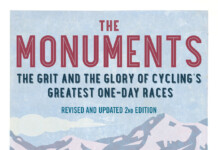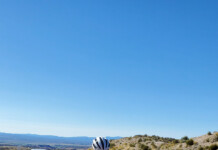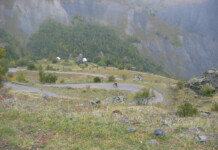It was 2003, and my wife, Karma, three of my children and I were in a small town in southwestern France. Karma and I had joined a tour group to watch several stages of the Tour de France, including Lance Armstrong’s incredible win on Luz Ardiden. Following that stage, we had our three daughters join us for a trip to Spain where one of those daughters had served a mission for our church.
Our first night after meeting up with our children was spent in Lourdes, a city of faith. It was a touching experience that night and the next morning to observe the faith and hope of hundreds of pilgrims who came to drink of the holy, healing waters. Faith can be a fragile commodity, and I was touched by the fervent faith of these pilgrims.
As we left that day, our route took us across the roads that Stage 16 of the Tour, Pau to Bayonne, would be following. A couple of times we found our way blocked and had to wait for the Tour’s procession to pass. Finally, we came to a small town where our route was again blocked as the peloton would soon be passing through. We had managed to catch news as we drove of the developments in that day’s stage, a monster stage with four major climbs, and learned that Tyler Hamilton had soloed away early during that stage. So we decided to wait in a café in that small town and watch the last part of the stage on the cafe’s television.
There was a fairly large and vocal contingent of fellow Tour observers at that café, many of whom were Americans. Of course, we were all wildly cheering Hamilton’s epic effort as he managed to stay away. As he approached our small town, we went out to the sidewalk and cheered him on. After that, we returned to the café and whooped and hollered as we watched him finish his magnificent ride to win the stage just ahead of a charging peloton.
Fast forward ten years to the release of Tyler Hamilton’s book, The Secret Race. He had, of course, been caught and branded a cheater years before. But in this book we learned that the night before his epic mountain stage victory in the 2003 Tour, he had received an illegal blood-boosting injection that propelled him to his victory. We, and especially my wife, felt betrayed. Our faith in Tyler had been complete in 2003, and we had given our hearts to him that day. Now, we felt cheated on in a personal way.
Of course, this was the year that all hell broke loose from what had been percolating for years. First, Lance Armstrong publicly stated he would no longer fight the charges of doping that the United States Anti-Doping Agency (“USADA”) had been pursuing, branding it an unconstitutional witch hunt. Thereafter, USADA had released its “Reasoned Decision” setting forth the basis for its charges against Armstrong. Subsequently, Armstrong was stripped of all his Tour de France victories.
And looking back, there was the 2006 Tour winner, Floyd Landis, who was stripped of his title shortly after his triumphal victory parade on the Champs-Elysées. Albert Contador who won in 2007, 2009 and 2010 was stripped of his 2010 victory, which, sadly, also taints his earlier victories. And, of course, there are the many, many others who have confessed, or at least no longer deny, their illegal performance enhancing efforts.
A breach of faith, especially on such a grand scale, leaves one skeptical, unwilling to be suckered again. So it was that 2012 winner Bradley Wiggins and, even more so, 2013 winner, Chris Froome, were constantly badgered by questions and suspicions of doping both during and after their Tour victories.
And so it also is that my wife, Karma, when someone is victorious in the Tour, or even a stage of the Tour, wonders if he is doping. It is a nagging suspicion, hard to ignore, particularly when someone so impressively rips the legs off all other pretenders on a hard, steep mountain top finish.
This year, Vincenzo Nibali has ridden an intelligent, impressive race on his way to overall victory. He started by winning Stage 2, and his riding skills on the cobbles in Stage 5 were an impressive display as he put nearly two minutes on Alberto Contador, his nearest rival after the unfortunate abandon of Chris Froome. With that ride, Nibali gained the advantage on Contador and set the foundation for his overall victory. Thereafter, he and his team rode intelligently and efficiently, allowing Nibali to conserve his considerable skills for key efforts during the remainder of the Tour.
Those efforts came on the steep mountain top finishes at La Planche Des Belles Filles, Chamrousse, and Pla d’Adet. And he was impressive. He timed his attacks well, and none could follow. He was magnificent. And my wife said, “I hope he’s not doping.” Later, my son commented, only half-jokingly, “I guess he doped better than the others.” And a daughter, when told Nibali had won by nearly eight minutes, commented, “He’s probably doping.” Nibali’s victory was a great one, and it hurts to hear these comments, though in my heart even I have to harbor a hope they are not true.
I remember last year when, atop the podium in Paris, and having had to respond to constant questions about and suspicions of doping, Chris Froome emphatically stated, “This is a victory that will stand the test of time!” I felt his emotion, but could not help but wonder, as a result of so many denials from so many others, if this was just bravado or the honest, vehement expression of a man who did not cheat. My wife just said, “I hope he’s telling the truth.”
I love my sport. To me, a bike race is a thing of beauty. I admire the skills and fortitude of all bike racers. I am especially impressed by the men who race the Tour. And I want to believe in them. I am a man of faith, and I choose to believe in them. When I hear the suspicions uttered by Karma and others, I defend them. Cycling has been through a tortuous crucible of redemption these last few years, and I believe the racers of today, including the great riders, with rare exception are racing clean. But right now, it is a fragile faith.
Years ago, we were friends with a couple and learned, sadly, of the husband’s infidelity. They separated and eventually divorce proceedings were filed. I don’t know what brought it about, but finally the man’s relationship with his girlfriend was ended and he returned to his wife. While this was going on, though, we were close with his children, and Karma was a friend and support to his wife.
Sometime after their reconciliation, he asked if he and his wife could take Karma and me to dinner and we agreed. During dinner, he thanked us for being good to his wife and children while they were going through this terrible ordeal. I appreciated his expression of gratitude, though Karma was certainly more deserving of it than me. In fact, however, I still harbored a lack of trust in him. I was not the one cheated on, but I have strong emotions about infidelity, and my faith in him was not easily restored.
In the many years since, this man has proven himself and his reformation. He is a good man, kind and generous, and I have come to admire and, yes, trust him. My faith in him has been restored, but it took several years.
Hundreds of thousands, maybe even a few million, of us are bicycle racing fans. And each July we love to follow the nearly month long excitement that is the Tour de France. Yet our trust has been breached, and it will not be easily extended again. Such restoration will take years, years of believable racing and results, and years of effective testing with few cheaters, particularly among the really elite racers.
Those years have already begun to roll by. In four years, we have had four different winners of the Tour. Cadel Evans in 2011, Bradley Wiggins in 2012 and Chris Froome in 2013, though consistent winners and consistently good, have also proven vulnerable, humanly vulnerable. Though they would all have liked to repeat, there is something refreshing in the fact they have not.
Now, Nibali is at the top. Can he repeat? The future will tell. He was awesome this year and has been consistently good in prior years, winning the Vuelta à España in 2010, taking third in the Tour in 2012 and winning the Giro d’Italia in 2013. Thankfully, he has a reputation for being a clean rider. Still, he readily acknowledges that such success would not have been possible, and indeed did not come, during the waning years of the doping culture. “Steps have been taken and great progress has been made, and with it so my results have arrived,” he stated as reported by AFP. “I have to thank them (doping controllers) because without these iron controls maybe I wouldn’t be here today.”
So I hope, and have faith, that within a few years, we can watch the Tour without wondering. That we can watch exquisite displays of athletic performance without suspicion. That Karma and I can watch an incredible finish on a mountain stage, and admire an impressive victor of the Tour de France, and Karma won’t have to say, “I hope he’s not cheating.”







